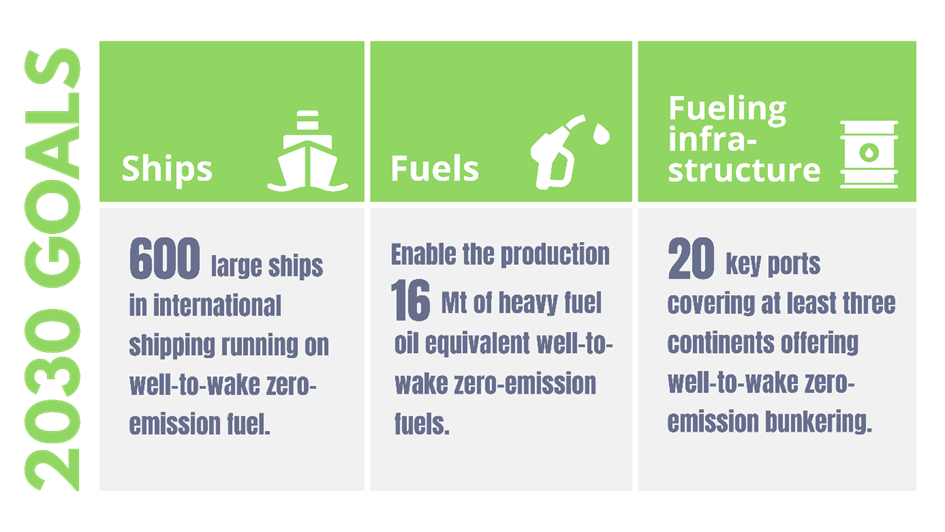Our goal is to demonstrate commercially-viable zero-emission ships by 2030, making vessels that operate on zero-emission fuels the natural choice for ship owners when they renew their fleet.
International shipping transports the majority of the world’s goods and is responsible for 3% of global emissions, potentially increasing by half by 2050 on its current trajectory. To set international shipping on an ambitious zero-emission trajectory, we need commercially viable, zero-emission ocean-going vessels in the global fleet by 2030.
The Plan
Coordinated innovation needs to take place across the entire maritime value chain, from the ships to the future zero-emission fuels they will rely on, and the infrastructure that will supply them. This will drive the sector to a tipping point in its transition to well-to-wake zero-emission fuels as soon as possible. The Mission will focus on the following three areas to achieve the goal:

Ships
Goal: 600 large ships in international shipping are running on well-wake zero-emission fuel by 2030.
Projects
- Zero-Emission Vessel Operation
- Safety of Crew in Low/Zero Emission Ships (SCILZS)
- Process of Alternative Design Approvals
- Transatlantic Green Ammonia Bulk Carrier Pilot

Fuels
Goal: Enable the production 16 Mt of heavy fuel oil equivalent (HFOe) well-to-wake zero-emission fuels by 2030.
Projects
- Port Scalable Zero-Emission Fuel Supply (Blueprint project)
- Port Readiness Level (PRL) Framework (Blueprint project)

Fueling Infrastructure
Goal: 20 key ports covering at least three continents offering well-to-wake zero-emission bunkering by 2030.
Projects
- US/ROK Green Corridor Pre-Feasibility Study
- Green Shipping Corridors Hub Website
- Oceans of Opportunity: Supplying Green Methanol and Ammonia at Ports.
News and Updates
To subscribe to the Zero Emission Shipping Newsletter, enter your E-mail address above!
By signing up you approve the Danish Maritime Authority’s privacy policy and data protection. Read the subscription terms here.
By subscribing to the newsletter, you also give consent for the Danish Maritime Authority to collect and process information about e.g. your email address
News Highlights
- [April 15, 2024] Today, the Zero-Emission Shipping Mission announced revised, more ambitious 2030 Mission goals during Singapore Maritime Week. Read the announcement.

- [April 15 2024] The Global Maritime Forum and RMI (founded as the Rocky Mountain Institute), under Mission Innovation’s umbrella, released a report today outlining strategies for ports to become first movers in providing green methanol and ammonia bunkering. Under the Shipping Mission’s “Fueling Infrastructure” pillar, the report provides insights into the sources of green methanol and ammonia that could be available to the shipping industry and how ports can secure supply to meet the International Maritime Organization’s (IMO) target of at least 5% use of zero-emission fuels by 2030. Read the report here.
- [February 8, 2024] Zero Emission Shipping Newsletter. Don’t forget to sign up to the Zero-Emissions Shipping Mission Newsletter below if you wish to stay updated on news, events and activities of the Shipping Mission.
- [October 12, 2023] Congratulating the IMO for adopting an ambitious GHG Reduction Strategy.
- [June 28, 2023] Zero Emission Shipping Newsletter.
- [April 17, 2023] Just Released: Zero-Emission Shipping Mission KPI Report
- [February 28, 2023] Germany joins the Zero-Emission Shipping Mission
- [February 13, 2023]Zero Emission Shipping Newsletter.
- [September 27, 2022] Zero Emission Shipping Newsletter
- [September 22, 2022] Action Plan for the Zero Emission Shipping Mission . Read the press release on the action plan launch at the Global Clean Energy Action Forum.
- [September 22, 2022]Australia and the European Commission have joined the ZESM.
- [September 20, 2022]Check out the ZESM LinkedIn page.
- [June 17,2022] 2022 Zero Emission Shipping Newsletter
- [April 4, 2022]Zero Emission Shipping Industry Roadmap.
- [November 8, 2021] Innovation Needs for Decarbonization of Shipping, Executive Summary, Extended Summary, and Technical Report.
- [June 2, 2021] The “Zero Emission Shipping” Mission was announced at the Sixth Mission Innovation Ministerial. Read our joint statement for more information.
- Watch Zero Emission Shipping launch video
Membership
Co-leads:
- Denmark (Ministry of Industry, Business and Financial Affairs, Ministry of Climate, Energy and Utilities and Ministry of Foreign Affairs) – Mission Statement
- The United States (U.S. Department of Energy) – Mission Statement
- Norway (Ministry of Climate and Environment) – Mission Statement
- Global Maritime Forum (representing the Getting to Zero Coalition) – Mission Statement
- Mærsk Mc-Kinney Møller Center for Zero Carbon Shipping – Mission Statement
Core Mission Members:
- United Kingdom (Department for Transport)
- Morocco (Ministry of Energy Transition & Sustainable Development)
- India (Ministry of Science and Technology)
- Singapore (Maritime and Ports Authority)
- Australia (Ministry for Climate Change and Energy)
Mission Support Group:
- France (Ministry of the Sea)
- Ghana (Ghana Maritime Authority)
- South Korea (Ministry of Trade, Industry and Energy)
- European Commission (Directorate-General for Research and Innovation)
- Canada (Transport Canada)
- Germany (Federal Ministry for Economics and Climate Action)
“In Denmark, we believe a greener future is possible – if we work together. As one of the world’s largest maritime nations, Denmark has initiated the Zero-Emission Shipping Mission, with great partners from the public and the private sector from all over the world. Our common goal is to make zero-emission vessels the natural choice for ship owners when they renew their fleet.”
Simon Kollerup, Danish Minister for Industry, Business, and Financial Affairs
“Through fearless technological innovation, ambitious clean energy deployment, and constructive international collaboration, we can build a net-zero carbon economy that creates millions of jobs and lifts our citizens into greater prosperity.”
Jennifer Granholm, U.S. Secretary of Energy
“The decarbonization of shipping will result in a growing global demand for climate technology in the years ahead. Norway’s and other countries leading position in green shipping can become an important competitive advantage, giving the maritime industry huge growth potential in international markets.”
Sveinung Rotevatn, Norwegian Minister for Climate and Environment
“Shipping is on the verge of a clean energy revolution. To set the global maritime industry on a climate-aligned course and meet the goals of the Paris Agreement, zero-emission vessels need to be the dominant and competitive choice by the end of this decade. The Zero-Emission Shipping Mission will accelerate public and private efforts around the world to make a zero emission fleet a reality by 2030.”
Johannah Christensen, Managing Director of the Global Maritime Forum
“The shipping industry needs to decarbonize to be part of the solution to the climate crisis. It will not be easy, and we don’t have a lot of time, but it is possible and now is the time to act. The Mærsk Mc-Kinney Møller Center for Zero Carbon Shipping is all about accelerating the transition by finding solutions through collaboration with partners across the ecosystem. With our partners we are proud and excited to co-lead this very important Zero Emission Shipping Mission.”
Bo Cerup-Simonsen, Chief Executive Officer of the Mærsk Mc-Kinney Møller Center for Zero Carbon Shipping
Contact Us:
Zero Emission Shipping Mission: shippingmission@dma.dk
Follow the Zero Emission Shipping Mission